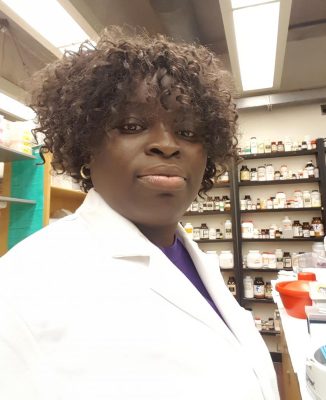Postdoc Spotlight: Sarah Adeyemo

Sarah Adeyemo is featured as part of Cornell’s Postdoc Appreciation Week 2016.
What is your area of research?
I currently work in Tim Setter’s lab studying a number of strategies (photoperiod, temperature, plant growth regulators, and grafting) to induce/hasten flowering in cassava. Cassava is the third most important source of calories in the tropics, after rice and maize. It is a major staple food, with billions of people depending on it all over the world, especially those in sub-Saharan Africa, Asia, and Latin America. However, flowering is a major limitation to its improvement. My research investigates the molecular genetic analysis of specific flowering genes in response to photoperiodic, temperature, and hormonal cues in cassava.
What inspired you to choose this field of study?
I became interested in plant molecular biology research during my senior year in college where I had the opportunity to conduct actual research on plants. I wasn’t working with cassava at that time but I was inspired by the high profile plant research the International Institute of Tropical Agriculture (IITA), a non-profit agricultural research-for-development (R4D) organization, was conducting. IITA is one of the world’s leading research partners in finding solutions for hunger, malnutrition, and poverty. I followed this career path after that encounter.
Why is this research important?
This research is very important because cassava is a vital food for millions of people in sub-Saharan Africa and the improvement of the genetic basis of this crop is paramount for food security. The genetic improvement of cassava has been slow because the biology of cassava makes traditional breeding approaches inefficient. Cassava encounters several obstacles to breeding for improved varieties. One is the difficulty in making a cross due to a long juvenile phase before flower initiation, non-synchronization of flowering, sporadic flower number, and poor seed set in the desired/best parents. Cassava generally shows wide variation in flowering time, rate, and fertility. Thanks to the $25m grant (NextGen Cassava) from the Bill and Melinda Gates Foundation, we are working to put in place methods that will dramatically increase the rate of genetic improvement of cassava varieties in sub-Saharan Africa by hastening the time to flower and improving the seed set of cassava so that crosses can be made more easily and that will produce more progeny.
How has your background influenced your scholarship?
Growing up in Nigeria, West Africa, the heightened level of food insecurity and poverty has always aggravated me. Motivated by a strong determination to make substantial contributions toward agriculture and to impact the present state of food security, I began the plant research journey. As a graduate student, I studied in-depth molecular biology strategies to hasten flowering in cassava. I’m currently applying these acquired skills in my current project, with the ultimate goal of poverty reduction and food security.
What else has influenced your thinking as a researcher or scholar?
The different mentors I have had over the years have influenced my thinking and contributed a great deal to my career. Similarly, the challenges I faced to get here continue to motivate me to succeed.
What other hobbies or activities do you enjoy in your spare time?
There are a number of things I like doing outside of the lab. I enjoy reading, singing in the choir downtown, cooking, travelling, gardening, and spending time with my little angels (my children) in many other outdoor pursuits.
Why did you choose Cornell?
Cornell University has been ranked the best university globally in plant and animal research, particularly in plant research and I am so proud to be a contributor in maintaining this global plant research ranking. I was also sought after because of the rare expertise I possess in cassava biotechnology research. Cornell is a great and inspiring place to be!
What’s next for you?
I am still working on this flowering project for now, but I will keep my options open to management positions in the public and/or private sectors and non-governmental organizations, all focusing on agriculture for poverty reduction and food security purposes.
Do you have any advice for current graduate students?
My advice to the current graduate students is to be passionate about your research, and be diligent and confident. Believe in yourself but seek help when it is clear you need help—don’t deceive yourself.
Interview by Sally Kral, communications and outreach assistant in the Graduate School
